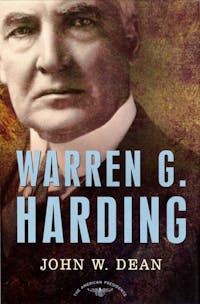Warren G. Harding
The American Presidents Series: The 29th President, 1921-1923
 Download image
Download image
ISBN10: 0805069569
ISBN13: 9780805069563
Hardcover
224 Pages
$31.00
CA$43.50
During his presidency, Warren G. Harding was beloved. His presidential campaign slogan, "not heroics but healing, not nostrums but normalcy," gave voice to a public exhausted by World War I. Harding inherited a White House in disarray after President Woodrow Wilson's debilitating stroke. He promised the American people that, under his watch, life and governance would once again be manageable.
His first priority was to bolster the economy, which had spiraled into recession after the end of the war. Despite his pro-business record as a U.S. senator and successful newspaper publisher in his hometown of Marion, Ohio, Harding became a self-styled populist. While he signed legislation limiting the number of immigrants in a tight labor market, he made exceptions for hard-luck cases. He placed the executive branch on a sound business footing with a new Bureau of the Budget, which succeeded in cutting expenditures by $1 billion, and rejected the politically popular war bonuses for soldiers that would have depleted the federal Treasury, paving the way for the economic boom of the 1920s. Harding initiated a series of historic disarmament treaties that reduced American, British, and Japanese naval fleets and limited the use of poison gas. He even gained a reputation for personally answering his own correspondence; magazine profiles lauded his efficient and smart approach to the presidency. By the spring of 1923, the U.S. economy was recovering, and Harding decided to take a tour of the West. When he died unexpectedly during the trip, nine million Americans lined railroad tracks to witness the funeral train as it passed, with crowds often singing the president's favorite hymn.
Yet Harding's legacy was soon tarnished by scandals not of his making. It was the Teapot Dome affair—in which the interior secretary had opened national oil reserves to private companies in exchange for alleged bribes—that made his name synonymous with scandal. Sensational headlines, congressional hearings, and criminal proceedings continued for a decade. Harding's ruin was sealed when a dubious tell-all memoir claimed that the president had had an extra-marital affair and had fathered an illegitimate daughter.
In this wise and compelling biography, John W. Dean—no stranger to presidential controversy himself—gives us a portrait of a man who succeeded in reestablishing order in the nation, struggled to keep order in his own administration, and literally gave his life to the presidency.
Reviews
Praise for Warren G. Harding
"Warren G. Harding is best known as America's worst president. This erroneous conclusion endures because the actual record of his presidency has, in fact, been largely overlooked. It was long believed, incorrectly, that Mrs. Harding had destroyed all of her husband's presidential papers. So the Harding history was largely written before it was learned that his papers were intact. He became a defenseless target of decades of false accusations and distortions. Those presidential papers have now been available for almost as long as they were not. Yet in the thirty-eight years that this information has been accessible, only a few published works have relied on Harding's senatorial and presidential papers. Even then, many who have written about Harding have uncritically perpetuated specious and baseless stories. My undertaking, however, has not been to challenge or catalogue all those who have gotten it wrong about Harding, only to get it right. I was curious to discern, as best I could, the truth of who he was, how he was elected, and how he operated and performed as president of the United States."—John W. Dean on Warren G. Harding
"Dean credibly highlights Harding's successes, [and gets] it about right when he writes that Harding 'was a natural at being head of state, but not at the administrative side of the presidency, that of being head of government' . . . The book is well-written and a welcome addition to the sparse Harding literature."—Library Journal
"[Here is a] brief account of a failed, scandal-ridden presidency, seen through the eyes of someone quite familiar with such things . . . Laboring valiantly to prove that the man infamous for his largely posthumous connection to the Teapot Dome scandal of 1923 does not quite merit the worst-president epithet, Dean credits Harding, who was inaugurated in 1921, for being unusually forward-thinking in his views on civil rights and social welfare. He was also, Dean writes, a highly effective practical politician who had few personal enemies (except for his wife's father, who in this account personifies everything bad about small-town capitalism) and valued consensus-building at all levels of government. The author credits Harding for braving unpopularity by taking a consistently conservative stand on fiscal matters, as when he risked damaging his career by refusing to pay a bonus to WWI veterans . . . Whatever his merits, Harding unwisely surrounded himself with self-serving counselors, among them a treasury secretary who brokered tax breaks for the wealthy, an interior secretary who enriched himself by selling off favors and titles from the public domain, and a veteran's affairs administrator who looted his department's budget.Although Harding served only 882 days in office before dying of a stroke, his relationship with those men and assorted other wrongdoers has served to tarnish his reputation ever since, even if, as Dean insists, none of the associated criminal investigations 'implicated Warren Harding in any corrupt activity or wrongdoing' . . . [Dean provides] a useful view of the long-forgotten leader."—Kirkus Reviews
Reviews from Goodreads
BOOK EXCERPTS
Read an Excerpt
1
Young Harding
Warren Harding's life began as the Civil War was ending. In the winter of 1864, George Tyron Harding, a Union solider—a fifer who had once shaken President Lincoln's hand at the White House—was sent home to...




